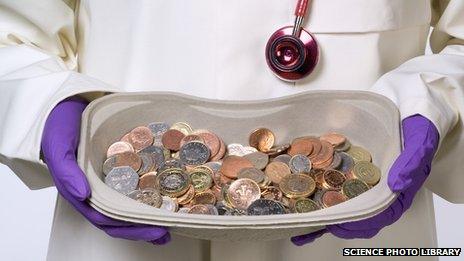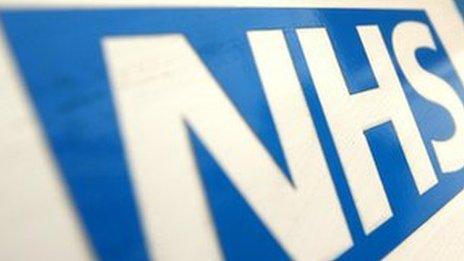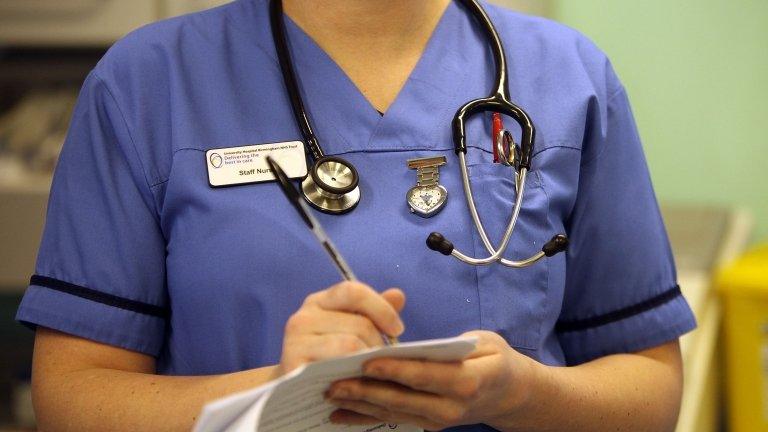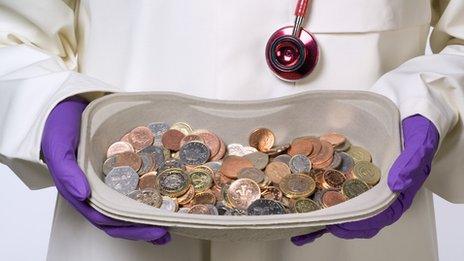NHS 'facing funding gap of up to £2bn' in England
- Published

Population growth is among the factors increasing pressure on NHS funds
The NHS in England faces a funding gap of up to £2bn, about 2% of its budget, for the next financial year, the BBC understands.
Senior health sources told the BBC growing costs would outstrip the money the NHS received from April 2015.
Health Secretary Jeremy Hunt is involved in Whitehall talks on how to plug the gap.
The Department of Health said it was "confident" it would "make the savings necessary to meet rising demand".
The NHS's budget in England for 2015 has been set at about £100bn.
'On track'
The NHS has experienced a prolonged budget freeze as part of the government's plan to reduce the UK deficit.
Its budget has been protected from cuts which have affected most other government departments, but spending has risen only at the rate of inflation.
Factors including population growth have led to increasing demand on NHS services and higher NHS pension costs have added to the financial pressure.
In a statement, the Department of Health said: "The NHS is on track to make £20bn savings this parliament and we are confident that it will continue to make the savings necessary to meet rising demand."
And speaking on Tuesday, the health secretary said he was confident in the sustainability of the NHS .
He cited a report from the US-based Commonwealth Fund think-tank, which ranked the NHS top in 2013 out of a list of healthcare systems in 11 leading countries around the world for effective, safe, co-ordinated and patient-centred care, access and efficiency.
But some health chiefs told the BBC the sums for the financial year beginning next April did not add up.
'Honest discussion'
Chris Ham, The King's Fund: "Everywhere you look across the NHS there are pressures facing patient care"
Chris Ham, chief executive of healthcare charity the King's Fund, said the situation reflected the increasing pressures hospitals were under to provide high quality patient care, short waits for operations and cancer care, speedy A&E access - and to balance their budgets too.
He said some hospitals could run out of money. "There is a real risk of that this year and particularly next year."
In 2015/16 about £2bn from the NHS budget will be put into the Better Care Fund, intended to help the NHS and local councils provide more integrated health and social care.
Mr Ham said while it was a good idea, it meant money being taken away from hospitals. "So they're having to find even bigger efficiency savings to balance the books and deliver good standards of patient care.
"That's a very, very big ask."
Shadow Health Secretary Andy Burnham also raised concerns about the Better Care Fund.
He said: "David Cameron is transferring large amounts of money out of the NHS to back-fill the hole he's created in social care finances.
"I am worried that the fund will set back the cause of integration and get it a bad name - the policy should be put on hold pending a full parliamentary debate."
Matt Tee, of the NHS Confederation which represents NHS trusts, added: "What we really need is for the NHS to have some certainty about the funding it will get in future years, so health service leaders can plan most effectively with their populations how to deliver the right services, in the right places, for the best value.
He called on politicians to commit to a 10-year funding settlement for the NHS.
Anita Charlesworth of the Health Foundation think-tank said the NHS had been "doing well" during austerity and had managed to make savings.
But she said: "There is a 'pincer' - as the NHS takes on more nurses, drug prices are rising and their pension costs are rising, as part of government policy."
And she warned: "We're not going to find this money behind the sofa, so it really would mean the Treasury stepping in.
"If it can't do that, we're faced with cutting services and cutting quality."
'Gap after savings'
Anita Charlesworth, The Health Foundation: NHS savings "not on scale required"
Meanwhile, an estimate by the health regulator, Monitor, underlines the possible scale of the challenge.
It says there is a funding gap of just over £5bn for 2015-16 in the NHS in England's £78bn commissioning budget for all secondary healthcare - which makes up about three quarters of its total budget and includes hospitals and mental health services.
Even after all realistic efficiency savings are made, Monitor says, a deficit of £1.6bn will remain in this section of the budget.
The concerns over the NHS budget in England come after recent research by the Nuffield Trust suggested the NHS in Wales was facing a £2.5bn funding gap over the next decade.
Health minister Mark Drakeford said that report, commissioned by the Welsh government, recognised long-term savings could be made if services continued to be reformed.
- Published17 June 2014

- Published4 June 2014
- Published1 April 2014

- Published22 February 2014

- Published31 January 2014

- Published1 October 2013